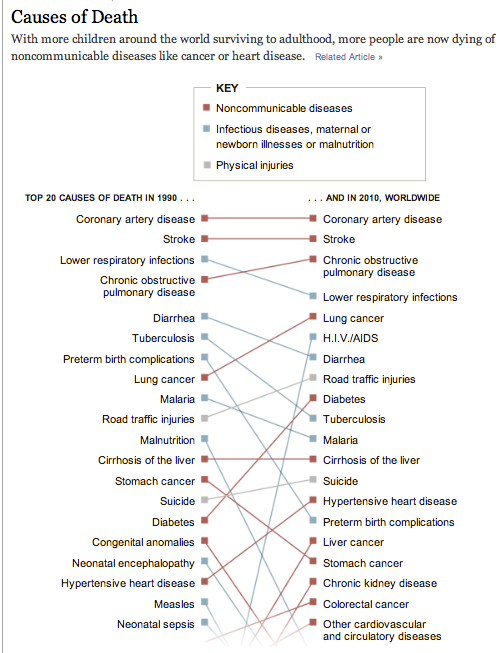The Future of Human Resilience - or Indulgence?
 Wednesday, February 17, 2016 at 11:57AM
Wednesday, February 17, 2016 at 11:57AM  THERE WILL ALWAYS BE TWO TYPES OF HUMANS: THOSE WHO SEEK TO "SAVE" THEMSELVES AND THEIR FUTURE (BY LIVING CAREFULLY) AND THOSE WHO SEEK TO "SPEND" THEIR LIVES (AND LITERALLY THEIR BODIES) AS AGGRESSIVELY AS POSSIBLE. On the former, think of vegan ascetics; on the latter, think of career military or NFL players. There is no right choice – just the choice. To quote the heavy-metal band Metallica, My lifestyle determines my death style. Except maybe now, thanks to emerging bio-technologies, it no longer will. At first glance, this is an unmitigated blessing: worn-out or diseased or damaged organs and bones replaced with organic replacements crafted from your own cells! But what happens to human behavior when people start to realize that today's extreme risks can be covered by emerging technological fixes? Are we suddenly braver? More foolhardy? More given to addictions? Less virtuous? In sum, does this form of new-school resilience (break it, replace it) somehow diminish the old-school variant (overcoming damage)?
THERE WILL ALWAYS BE TWO TYPES OF HUMANS: THOSE WHO SEEK TO "SAVE" THEMSELVES AND THEIR FUTURE (BY LIVING CAREFULLY) AND THOSE WHO SEEK TO "SPEND" THEIR LIVES (AND LITERALLY THEIR BODIES) AS AGGRESSIVELY AS POSSIBLE. On the former, think of vegan ascetics; on the latter, think of career military or NFL players. There is no right choice – just the choice. To quote the heavy-metal band Metallica, My lifestyle determines my death style. Except maybe now, thanks to emerging bio-technologies, it no longer will. At first glance, this is an unmitigated blessing: worn-out or diseased or damaged organs and bones replaced with organic replacements crafted from your own cells! But what happens to human behavior when people start to realize that today's extreme risks can be covered by emerging technological fixes? Are we suddenly braver? More foolhardy? More given to addictions? Less virtuous? In sum, does this form of new-school resilience (break it, replace it) somehow diminish the old-school variant (overcoming damage)?Whatever the pathway, it seems clear that the nature of humanity's physical resilience will be transformed – profoundly augmented by biotechnologies that allow us to walk away from our mistakes, sufferings, bad luck, bad DNA, bad behavior, etc.
Two stunning examples, the first on 3-D printing:
A new method of 3-D printing can produce human-sized bone, muscle, and cartilage templates that survive when implanted into animals, researchers report.
"It has been challenging to produce human scale tissues with 3-D printing because larger tissues require additional nutrition," Dr. Anthony Atala from Wake Forest School of Medicine, Winston-Salem, North Carolina told Reuters Health by email.
His team developed a process they call "the integrated tissue and organ printing system," or ITOP for short. ITOP produces a network of tiny channels that allows the printed tissue to be nourished after being implanted into a living animal.
The researchers produced three types of tissue - bone, cartilage, and muscle - and transplanted it into rats and mice.
Five months after implantation, the bone tissue looked similar to normal bone, complete with blood vessels and with no dead areas, the research team reported in Nature Biotechnology . . .
Results with 3-D printed skeletal muscle were equally impressive. Not only did the implants look like normal muscle when examined two weeks after implantation, but the implants also contracted like immature, developing muscle when stimulated . . .
"We are also using similar strategies to print solid organs," [Atala] added.
That's the human hardware, so to speak. Now on to the software . . .
Miniature brains [see image above] that show electrical activity akin to “a primitive type of thinking” could revolutionise how some drugs are tested and reduce the need for animals in research, according to scientists who have developed the structures.
Each ball of human brain cells - in all about the size of the head of a ballpoint pen - “represents more or less a two-month-old brain” of a foetus, Prof Thomas Hartung of Johns Hopkins University said, presenting the work at the American Association for the Advancement of Science conference . The cultures also show “spontaneous electrophysiological activity” – their neurons zap off electrical signals to each other without prompting.
“It’s starting to produce a primitive type of ‘thinking,’” Hartung said, though he stressed that the operation is only mechanical. “Obviously there’s no input or output. It is meaningless electrical activity but the neurons are trying to communicate with each other.”
Scientists first developed miniature brains in test tubes in December 2013, but Hartung said that his team has managed to standardise the new “mini-brains” – meaning they can grow hundreds of uniform brain cultures in a single petri dish, rather than a few cultures each grown according to their distinct genetic codes . . .
Hartung said the neural activity, which can be measured with an EEG-like device, creates a “third dimension” for studying the effects of drugs: not only can researchers examine how drugs affect the health and function of brain cells, they can also see what drugs do to neural activity.
An obvious good in terms of drug testing and particularly in attacking brain-centric conditions and diseases like Alzheimer's. But note how quickly the doctor dismissed the notion of actual "thinking" being triggered. That inevitability, plus the comparison to a fetus, starts to feel a lot more God-like.
But, frankly, it's all God-like. In human history, there are two great brakes on behavior: one is the reality of the human body (you will pay for your bad or risky behavior!) and belief in the afterlife (and, if you don't, then God will make you pay for eternity). For now, we seem to be messing only with the first equation – the hard and fast one that only the most genetically fortunate can escape. But yes, we will eventually get around to the second one.
In both instances, though, we're leveling a playing field that's been magnificently tilted throughout human existence, and that is going to revolutionize our sense of risk – both individually and collectively. If you think that technology can save your skin (literally), you'll be more willing to push all manner of envelopes. At first, it will be – as usual – only the rich who can afford such a mindset. You see that today in cosmetic surgery, but these technologies will take that advantage to an entirely new level.
At some point, access to such technologies becomes a political issue – not unlike the shadowy question of who should be prioritized today for donor organs (the virtuous disease-sufferer or the person who destroyed their liver with alcohol). Eventually, expect that access to be defined a "human right" – upon threat of political revolution.
Again, whatever the pathway, these technologies will spread. They will be "democratized" like all before them. And they will dramatically alter human behavior – first individually and then in organizations. Legal and political systems will need to change in response.
And the notion of human resilience will never be the same again.
 healthcare,
healthcare,  resilience,
resilience,  technology | in
technology | in  Citation Post |
Citation Post |  Email Article |
Email Article |  Permalink |
Permalink |  Print Article
Print Article 































